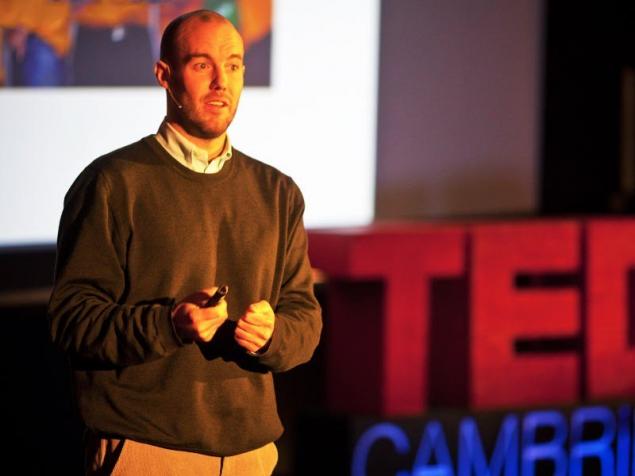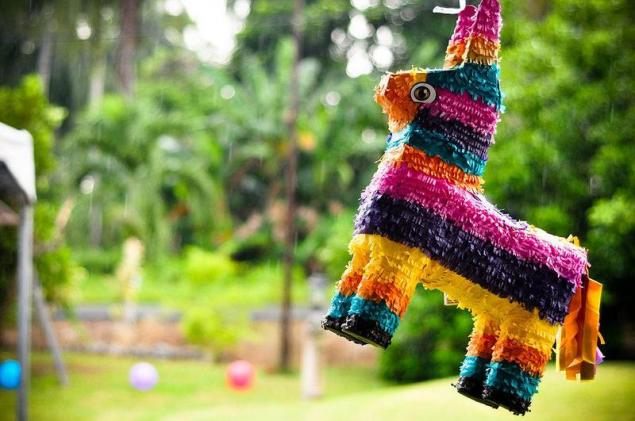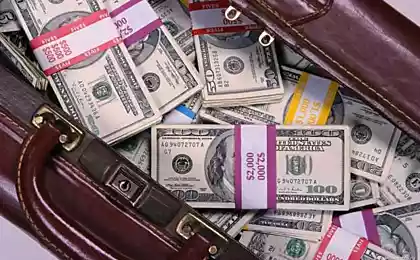723
Michael Norton: How to buy happiness
People are happier when they give money, than keeping it for yourselfMichael Norton , a psychologist and a doctor of philosophy, Professor of business administration in marketing, works at Harvard business school.
His lecture the Professor refutes the statement "money can't buy Happiness". "You can buy happiness if you know how to spend money," says Norton. The author tells of studies conducted by him and his team. Work with many people in different corners of our planet, the results of which indicate a direct path to personal happiness. The universal law working in icy Canada, and in hot Africa, says:"Bringing good to people, do happy yourself."

"I want to talk today about money and happiness. These are two things that many of us spend a lot of time trying to either earn them, or multiply.
Many of us resonate with this phrase. It is found in religions and self-help books: "money can't buy happiness." I mean, that's not true. I work in a business school, and we do. So, this is not true. If you really think so, then you're not wasting money.
Instead of spending the money, maybe if you spent it differently, the result will be slightly better.
But before I tell you how to spend the money to become happier, let's think about how we usually spend it without becoming happier. We had a little natural experiment. Recently, si-EN-EN has published an interesting article about what happens to people when they win the lottery. It turns out that people think that if they win the lottery, their lives will be transformed. The article is about how their lives are ruined. Winning the lottery, the first thing people do is spend all the money and go into debt. And second — all of their friends and various acquaintances immediately find and begin to beg for money. It ruins their social relationships. In the end, they have more debt and worse friendships than they had before they won the lottery. But the most interesting in this article — the comments of the readers. Instead of talking about how the article made them think that money doesn't bring happiness, all began to speak in the spirit: "you know what I would do if I won the lottery?.." This was followed by fantasies on this topic. Here are just two examples that we found particularly interesting. One person wrote: "When I win, I'll buy myself a small mountain and build a house on top". And another wrote: "I would fill a big bathtub with money and get it, I'll sit and smoke a big fat cigar, sipping champagne from a glass". Further — is worse: "Then I will have a picture taken and make dozens of glossy copies. And who's going to ask me for money or trying to take, get a copy of the photo and nothing more." Such comments were in the majority.
People got money and became antisocial. I said that money ruins people's lives and friends at pesky flies. More money makes us feel very selfish and we care only about yourself. Maybe money doesn't make us happy because we find them inappropriate use — we spend them on. So we thought about what it would take to convince people to spend more money on others. That is, instead of hiding behind their money from society, it would be possible to use some of the money for the benefit of society.
We decided to give people the opportunity and see what happens.
Suppose there is a group of people in a traditional way-spending money on themselves and another group where the people handing out the money. We measure their happiness and see whether they will be happier. That's where we started. On one Vancouver morning, we went out on the campus of the University of British Columbia and we approached people and said "do you Want to participate in the experiment?" They said, "Yes." We asked them how happy they were, and then handed them an envelope. In one envelope was a note: "Spend the money on yourself until five in the evening". And the options of how to spend it. Other people in the same morning received the following note: "Spend the money on other until five in the evening". Inside each envelope was money. The amount of money, too, was different. Some people got a note and five dollars. Other — note and twenty dollars. We left them alone. They could do what they wanted. Then we found out that the money was indeed spent according to the instructions.
In the evening we called them up and asked, "what did you spend your money and how you now happy?" So what was the money spent? Since we are talking about students, the majority spent on themselves went for bling, like earrings and makeup. One woman said that the child had a toy. People gave money to the homeless. Huge effect here of Starbucks (coffee chain Starbucks)
If you give undergraduates five dollars, to them is coffee money. They run to Starbucks and spend my fiver as quickly as possible. But some people bought a coffee for themselves, as they have always done, while others said that they bought a coffee for somebody else. So the very same purchase, just perfect either for yourself or for someone else. What did we find when we called them in the evening? People who spent money on others got happier. People who spent money on themselves, nothing has changed. They do not become less happy.For them it is just not affected. It turned out that the amount of money does not play a role. People thought $ 20 is much better than $ 5. In fact, it does not matter how much money to spend.
The important thing is to spend it on someone else and not for themselves. We see this again and again, giving people money to spend on others and not on yourself. Of course, we are talking about canadian students — not the typical sample of the population. They are generally quite wealthy.
We wanted to see if our experiment anywhere else in the world, or just among wealthy countries. We decided to go to Uganda and ran a very similar experiment. But people in Canada, we asked: "Remember when was the last time you spent money on yourself or other people. Describe it.How happy are you?"
And in Uganda, our question was: "Remember, when was the last time you spent money on yourself or other people and describe that". And then we again asked how happy they feel. In the end, we got amazing results. There are some General techniques of how people manage their money, but at the same time there are cultural differences in what people do.
For example, one guy in Uganda told us: "I called the girl that wanted to meet." They went on a date, and then he said that "achieve" her up till now. And here's a canadian guy. The story is very similar. "We went with the girl to dinner at a restaurant. Then went to the movies, we left early and went back to her "Cup of tea" — and only tea. Human universal -- so you spend money on other people, you were attentive to him. Maybe you had something on your mind, maybe not. But then we see extraordinary differences.
Let's take two more examples. Here is a woman from Canada. We asked her: "Remember when you spent the money on someone else". She said, "I bought a gift for mom. I drove the car to the Mall, bought a present and gave it to mother." A wonderful act of kindness. To get gifts for people it's nice.Compare that to this woman from Uganda. "I was walking down the street and met an old friend, whose son was sick with malaria. They had no money, but they went to the hospital. I gave her the money". It's not 10,000 dollars, is the local currency. Actually, it's a small amount. There is an obvious huge difference in the motives. This is a real medical need, where the money will literally save lives. And before just buying a gift for my mother.
We again see that asyou spend money on other people, much less important than the fact that you spend it on others, to become happier. This is especially important. Not to do with money, nothing unusual to be happier. You can do something small, trivial and still get satisfaction from it. These are examples of just two countries. We wanted to go even broader and look at every country in the world to see how the money correlates with happiness.
Gallup, known for its recent political polls that have given us such data. They asked people: "You have recently donated money to charity?", and then: "How happy are you with life?" You can see how these two aspects relate to each other.
Everywhere you look, everywhere we see that people are happier when they give money, than keeping it for yourself.
What about at work, where we spend all the time when we are not with friends and acquaintances?
We decided to infiltrate some companies and do a very similar experiment. Before you a group of sales representatives from Belgium. They work in teams; they go to the doctors ' offices and offer them to buy drugs. We can see how well they sell, when the work is done by the team.
In some groups we have given money to the staff and said, "Can spend the money on whatever you like". The same script that we used with students in Canada. Other teams we say:"Here's 15 euros. Spend it on one of your colleagues this week. Buy them something as a gift and give". Then we'll see what happens. We have groups that spend money on themselves, and a sort of altruistic groups that we give money to so that they can help their group become better. One of the teams pooled their money and bought a pinata (piñata is a hollow toy made from papier-mache or cardboard, filled with various sweets, confetti, gifts and surprises). Then they got together smashed the pinata and all the candy fell out everywhere. Pretty simple, unpretentious fun, but think about it, what's the difference between this group and those who did not do anything, and just took my 15 euros, put them in his pocket, maybe bought themselves a coffee. But this group did something together, as a team they have bought something and together glad.

We also saw that altruistic groups have sold more than groups that spent money on themselves.Think about it is for every 15 Euro you give to personal needs, people put in his pocket and did nothing new. This behavior is not enriching. You actually lose money because of lack of motivation to work harder. But if you give them 15 Euro to spend on their teammates, they will better work together and benefit from this investment money will be huge. You are probably thinking that this is all well and good, but there is one situation that is very important for public policy, where this principle does not work.
And if I don't prove you otherwise, you wouldn't believe a word I say. I know everyone's mad game of dodgeball. We are seriously criticized and said that if we can prove that our approach works in teams of bouncers, this is all stupid. So we found the team a dodgeball and introduced them to our people. We gave them all the same experiment. In some teams, we give them money so they spent it on themselves. In other teams, we give them the money that players spend on their teammates. The success of the teams that spent money on themselves, remained the same as before the experiment. The teams where the money was spent on comrades, it is transformed and even took the lead at the end of the experiment.
In all considered situations in your personal life, at work, even in a silly running away from the ball within the four walls — we have seen that when you spend money on others, you get more than when you spend money on yourself. Therefore, I repeat that if you think that happiness for money can't buy, you're not spending it. The point is not whether to buy one product instead of another in the hope that it will make you happy. The point is to stop thinking what to buy for yourself and think about what to share with other people.
Fortunately, we can help you. DonorsChoose.org is a non — profit organization helping teachers in low-budget public schools.
They publish their projects. For example: "I would like to have my students read "Huckleberry Finn," but we have no books." Or: "I need a microscope for science class, but I don't have it". We can buy these things for them. The teacher will write you a thank you note. Maybe even send you a picture to show how they will use the microscope. This is a wonderful initiative. Go to this site and try to think less about how to spend money on myself, used to love how your five or fifteen dollars you can bring happiness to other people. You will see that in the end all the more you benefit yourself. Thanks."posted
https://embed.ted.com/talks/michael_norton_how_to_buy_happiness
@ Michael Norton
P. S. And remember, just changing your mind — together we change the world! ©
Source: //www.ted.com/talks/michael_norton_how_to_buy_happiness/transcript?language=ru
His lecture the Professor refutes the statement "money can't buy Happiness". "You can buy happiness if you know how to spend money," says Norton. The author tells of studies conducted by him and his team. Work with many people in different corners of our planet, the results of which indicate a direct path to personal happiness. The universal law working in icy Canada, and in hot Africa, says:"Bringing good to people, do happy yourself."

"I want to talk today about money and happiness. These are two things that many of us spend a lot of time trying to either earn them, or multiply.
Many of us resonate with this phrase. It is found in religions and self-help books: "money can't buy happiness." I mean, that's not true. I work in a business school, and we do. So, this is not true. If you really think so, then you're not wasting money.
Instead of spending the money, maybe if you spent it differently, the result will be slightly better.
But before I tell you how to spend the money to become happier, let's think about how we usually spend it without becoming happier. We had a little natural experiment. Recently, si-EN-EN has published an interesting article about what happens to people when they win the lottery. It turns out that people think that if they win the lottery, their lives will be transformed. The article is about how their lives are ruined. Winning the lottery, the first thing people do is spend all the money and go into debt. And second — all of their friends and various acquaintances immediately find and begin to beg for money. It ruins their social relationships. In the end, they have more debt and worse friendships than they had before they won the lottery. But the most interesting in this article — the comments of the readers. Instead of talking about how the article made them think that money doesn't bring happiness, all began to speak in the spirit: "you know what I would do if I won the lottery?.." This was followed by fantasies on this topic. Here are just two examples that we found particularly interesting. One person wrote: "When I win, I'll buy myself a small mountain and build a house on top". And another wrote: "I would fill a big bathtub with money and get it, I'll sit and smoke a big fat cigar, sipping champagne from a glass". Further — is worse: "Then I will have a picture taken and make dozens of glossy copies. And who's going to ask me for money or trying to take, get a copy of the photo and nothing more." Such comments were in the majority.
People got money and became antisocial. I said that money ruins people's lives and friends at pesky flies. More money makes us feel very selfish and we care only about yourself. Maybe money doesn't make us happy because we find them inappropriate use — we spend them on. So we thought about what it would take to convince people to spend more money on others. That is, instead of hiding behind their money from society, it would be possible to use some of the money for the benefit of society.
We decided to give people the opportunity and see what happens.
Suppose there is a group of people in a traditional way-spending money on themselves and another group where the people handing out the money. We measure their happiness and see whether they will be happier. That's where we started. On one Vancouver morning, we went out on the campus of the University of British Columbia and we approached people and said "do you Want to participate in the experiment?" They said, "Yes." We asked them how happy they were, and then handed them an envelope. In one envelope was a note: "Spend the money on yourself until five in the evening". And the options of how to spend it. Other people in the same morning received the following note: "Spend the money on other until five in the evening". Inside each envelope was money. The amount of money, too, was different. Some people got a note and five dollars. Other — note and twenty dollars. We left them alone. They could do what they wanted. Then we found out that the money was indeed spent according to the instructions.
In the evening we called them up and asked, "what did you spend your money and how you now happy?" So what was the money spent? Since we are talking about students, the majority spent on themselves went for bling, like earrings and makeup. One woman said that the child had a toy. People gave money to the homeless. Huge effect here of Starbucks (coffee chain Starbucks)
If you give undergraduates five dollars, to them is coffee money. They run to Starbucks and spend my fiver as quickly as possible. But some people bought a coffee for themselves, as they have always done, while others said that they bought a coffee for somebody else. So the very same purchase, just perfect either for yourself or for someone else. What did we find when we called them in the evening? People who spent money on others got happier. People who spent money on themselves, nothing has changed. They do not become less happy.For them it is just not affected. It turned out that the amount of money does not play a role. People thought $ 20 is much better than $ 5. In fact, it does not matter how much money to spend.
The important thing is to spend it on someone else and not for themselves. We see this again and again, giving people money to spend on others and not on yourself. Of course, we are talking about canadian students — not the typical sample of the population. They are generally quite wealthy.
We wanted to see if our experiment anywhere else in the world, or just among wealthy countries. We decided to go to Uganda and ran a very similar experiment. But people in Canada, we asked: "Remember when was the last time you spent money on yourself or other people. Describe it.How happy are you?"
And in Uganda, our question was: "Remember, when was the last time you spent money on yourself or other people and describe that". And then we again asked how happy they feel. In the end, we got amazing results. There are some General techniques of how people manage their money, but at the same time there are cultural differences in what people do.
For example, one guy in Uganda told us: "I called the girl that wanted to meet." They went on a date, and then he said that "achieve" her up till now. And here's a canadian guy. The story is very similar. "We went with the girl to dinner at a restaurant. Then went to the movies, we left early and went back to her "Cup of tea" — and only tea. Human universal -- so you spend money on other people, you were attentive to him. Maybe you had something on your mind, maybe not. But then we see extraordinary differences.
Let's take two more examples. Here is a woman from Canada. We asked her: "Remember when you spent the money on someone else". She said, "I bought a gift for mom. I drove the car to the Mall, bought a present and gave it to mother." A wonderful act of kindness. To get gifts for people it's nice.Compare that to this woman from Uganda. "I was walking down the street and met an old friend, whose son was sick with malaria. They had no money, but they went to the hospital. I gave her the money". It's not 10,000 dollars, is the local currency. Actually, it's a small amount. There is an obvious huge difference in the motives. This is a real medical need, where the money will literally save lives. And before just buying a gift for my mother.
We again see that asyou spend money on other people, much less important than the fact that you spend it on others, to become happier. This is especially important. Not to do with money, nothing unusual to be happier. You can do something small, trivial and still get satisfaction from it. These are examples of just two countries. We wanted to go even broader and look at every country in the world to see how the money correlates with happiness.
Gallup, known for its recent political polls that have given us such data. They asked people: "You have recently donated money to charity?", and then: "How happy are you with life?" You can see how these two aspects relate to each other.
Everywhere you look, everywhere we see that people are happier when they give money, than keeping it for yourself.
What about at work, where we spend all the time when we are not with friends and acquaintances?
We decided to infiltrate some companies and do a very similar experiment. Before you a group of sales representatives from Belgium. They work in teams; they go to the doctors ' offices and offer them to buy drugs. We can see how well they sell, when the work is done by the team.
In some groups we have given money to the staff and said, "Can spend the money on whatever you like". The same script that we used with students in Canada. Other teams we say:"Here's 15 euros. Spend it on one of your colleagues this week. Buy them something as a gift and give". Then we'll see what happens. We have groups that spend money on themselves, and a sort of altruistic groups that we give money to so that they can help their group become better. One of the teams pooled their money and bought a pinata (piñata is a hollow toy made from papier-mache or cardboard, filled with various sweets, confetti, gifts and surprises). Then they got together smashed the pinata and all the candy fell out everywhere. Pretty simple, unpretentious fun, but think about it, what's the difference between this group and those who did not do anything, and just took my 15 euros, put them in his pocket, maybe bought themselves a coffee. But this group did something together, as a team they have bought something and together glad.

We also saw that altruistic groups have sold more than groups that spent money on themselves.Think about it is for every 15 Euro you give to personal needs, people put in his pocket and did nothing new. This behavior is not enriching. You actually lose money because of lack of motivation to work harder. But if you give them 15 Euro to spend on their teammates, they will better work together and benefit from this investment money will be huge. You are probably thinking that this is all well and good, but there is one situation that is very important for public policy, where this principle does not work.
And if I don't prove you otherwise, you wouldn't believe a word I say. I know everyone's mad game of dodgeball. We are seriously criticized and said that if we can prove that our approach works in teams of bouncers, this is all stupid. So we found the team a dodgeball and introduced them to our people. We gave them all the same experiment. In some teams, we give them money so they spent it on themselves. In other teams, we give them the money that players spend on their teammates. The success of the teams that spent money on themselves, remained the same as before the experiment. The teams where the money was spent on comrades, it is transformed and even took the lead at the end of the experiment.
In all considered situations in your personal life, at work, even in a silly running away from the ball within the four walls — we have seen that when you spend money on others, you get more than when you spend money on yourself. Therefore, I repeat that if you think that happiness for money can't buy, you're not spending it. The point is not whether to buy one product instead of another in the hope that it will make you happy. The point is to stop thinking what to buy for yourself and think about what to share with other people.
Fortunately, we can help you. DonorsChoose.org is a non — profit organization helping teachers in low-budget public schools.
They publish their projects. For example: "I would like to have my students read "Huckleberry Finn," but we have no books." Or: "I need a microscope for science class, but I don't have it". We can buy these things for them. The teacher will write you a thank you note. Maybe even send you a picture to show how they will use the microscope. This is a wonderful initiative. Go to this site and try to think less about how to spend money on myself, used to love how your five or fifteen dollars you can bring happiness to other people. You will see that in the end all the more you benefit yourself. Thanks."posted
https://embed.ted.com/talks/michael_norton_how_to_buy_happiness
@ Michael Norton
P. S. And remember, just changing your mind — together we change the world! ©
Source: //www.ted.com/talks/michael_norton_how_to_buy_happiness/transcript?language=ru























